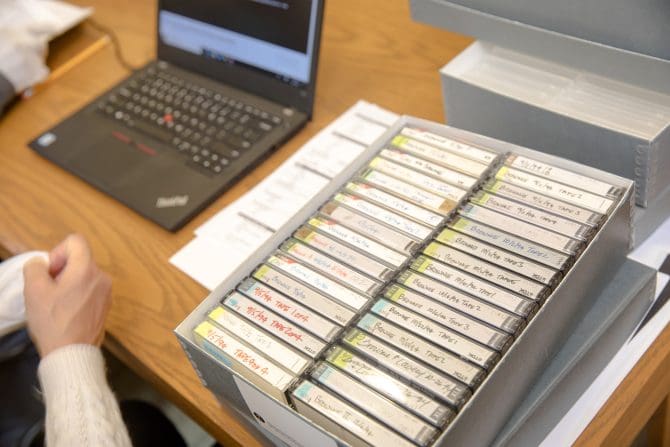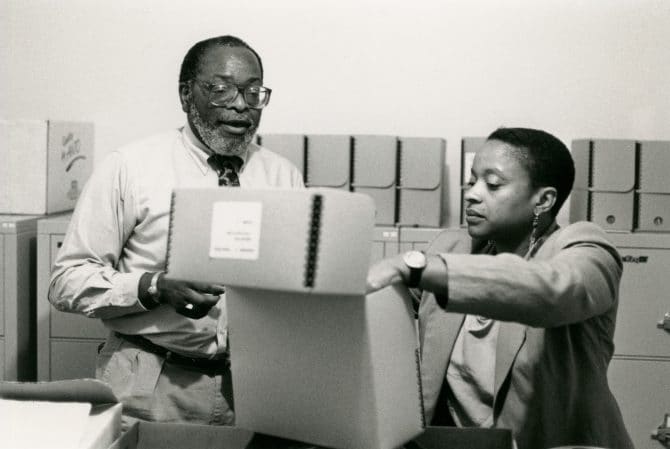
This resource guide provides tips for first-time researchers preparing to visit AAMLO's archives.
It highlights :
- Introduction to Archival Research
- How to Use the Online Archive of California (OAC)
- Exploring the Finding Aids
- Our Digital Collections
- Periodicals and Microfilm
- What to Expect / Reading Room Policies
- Reproductions and Permissions
Please contact AAMLO (aamlo@oaklandlibrary.org) with any questions or to schedule an appointment to view materials in person.
Introduction to Archival Research
AAMLO's archival holdings include over 160 collections and are a unique resource on the history of African Americans in Northern California and the Bay Area. Unlike the books in our study library, AAMLO's archival material is not available for browsing. Due to their historic value and uniqueness, an archivist will help retrieve materials that you request in advance. Schedule an appointment or contact us at aamlo@oaklandlibrary.org or 510-637-0200 to learn more.
The archives reading room is a quiet space where you can view and research materials by appointment. For more information on our reading room policies, please read the section on What to Expect / Reading Room Policies.
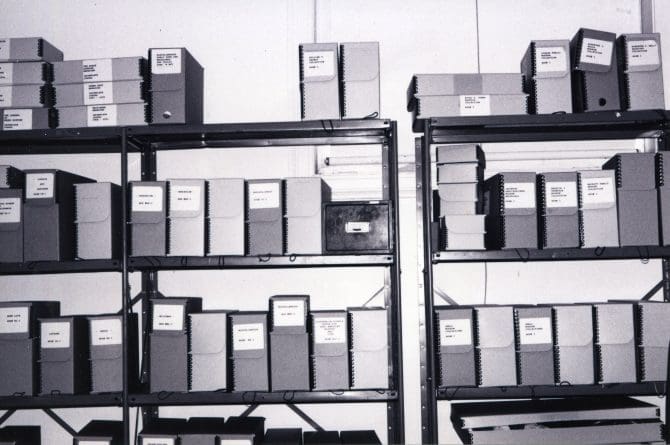
How to Use the Online Archive of California (OAC)
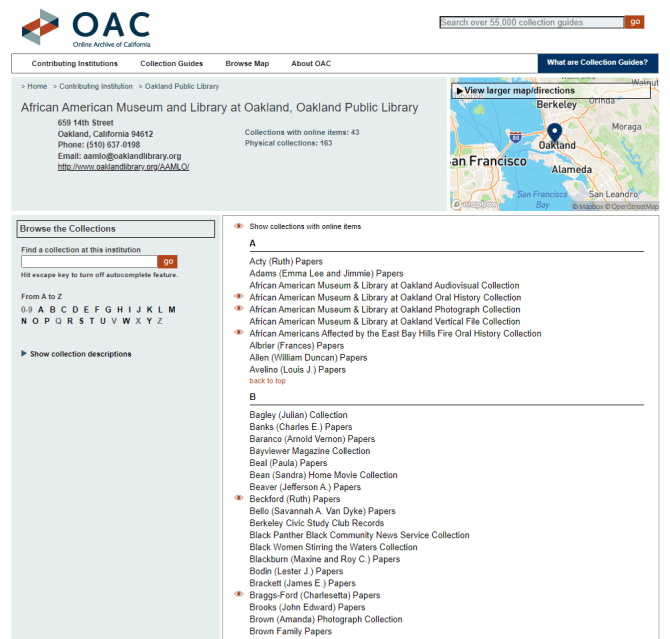
Archival collections are organized and described differently from library materials like books. A finding aid is a tool that explains how an archival collection came to be and how it is arranged. It will also include an inventory of items in a collection.
AAMLO's finding aids can be found on the Online Archive of California (OAC).
OAC is a website that pulls together finding aids and collection guides contributed by libraries and other cultural heritage institutions throughout the state, maintained by the University of California.
You can also browse all archival collections at the Oakland Public Library on the OPL webpages alphabetically or by subject, including "African Americans" or "Black History."
Exploring the Finding Aids
To search our collections, first enter a search term in the "Find a collection at this institution" field at AAMLO's webpage on OAC. Searches can include names ("Slim Jenkins"), organizations ("Allen Temple Baptist Church"), neighborhoods ("West Oakland") or keywords ("baseball"). If you're stuck for ideas, AAMLO has a variety of special topic resource guides to help get you started.
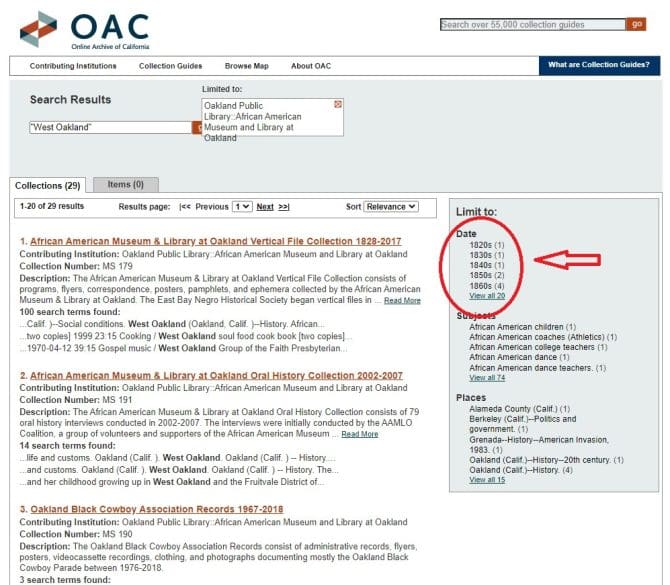
Once you run a search, you can further narrow your search results by decade or by subject. If you're only interested in material about West Oakland from the 1960s, for example, you could select results limited to that decade.
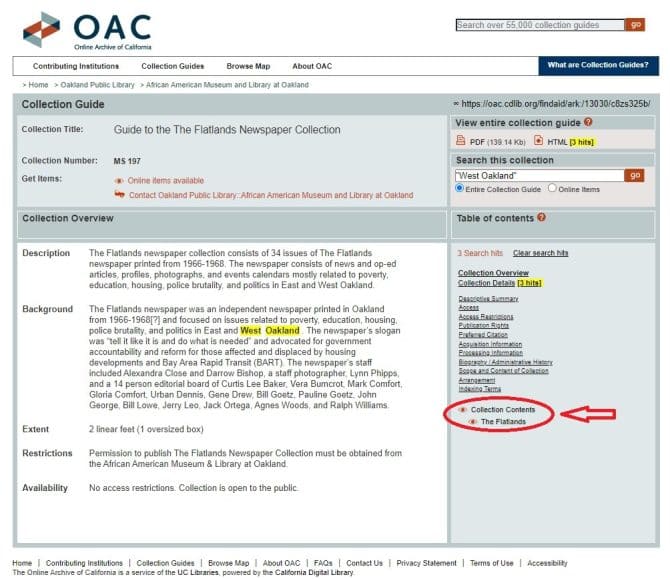
The collection guide, or finding aid, will highlight where your search term appears. In this example, the Description and Background notes tell us that The Flatlands Newspaper Collection consists of 34 issues of The Flatlands, an independent newspaper printed from 1966-1968 that "focused on issues related to poverty, education, housing, police brutality, and politics in East and West Oakland."
To discover more about the collection, click through any of the Collection Details (in the box to the right), which include information such as the Biography/Administrative History and the Scope and Content of Collection. Most of AAMLO's finding aids will include helpful information such as:
- Creator - Who brought the collection together
- Collection Size - How many boxes it is
- Biography / Administrative History - Some background on the creator (including biographies, chronologies, and historical details) or other contextual information about how the collection was formed or gathered together
- Scope and Content of Collection - What types of material are included
- Arrangement - Explains how items in the collection are arranged
- Indexing Terms - What keywords/subjects are related to the collection
You can view the full inventory by clicking on the Collection Contents. The finding aid will usually include a detailed index of the collection contents, with a listing of materials by box, folder, and an item description.
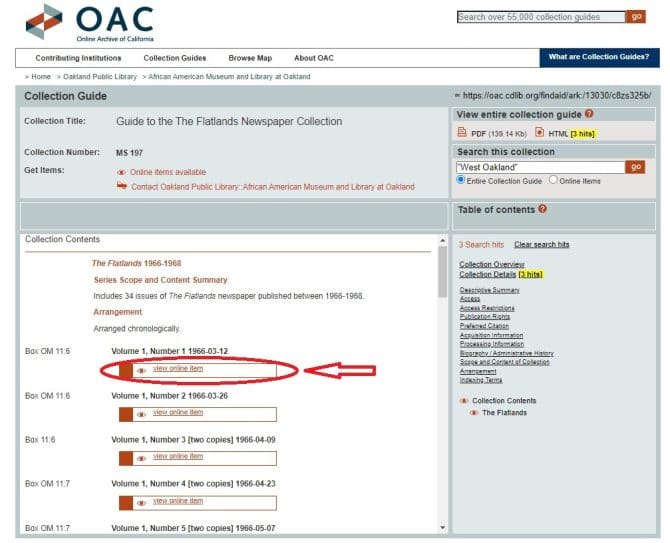
Where a digital copy of an item is available, you'll see an option to View Online Item.
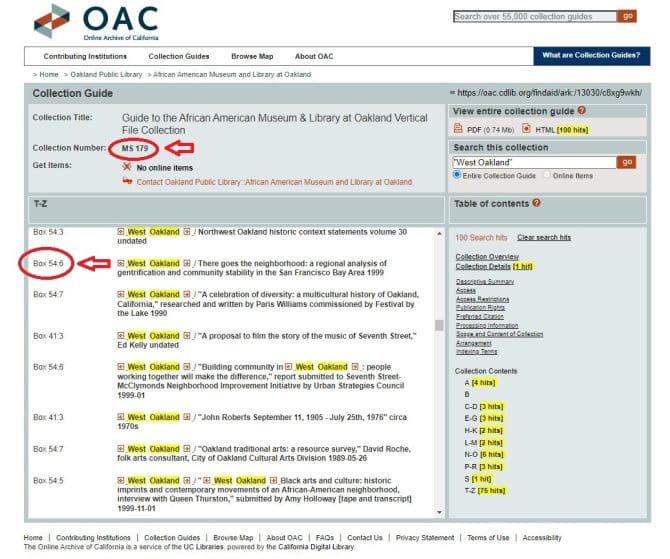
Otherwise you can look for details about the location of a particular item by its box number and folder number. In order to best help us retrieve material for you, be sure to include information about the:
- Collection Title or Collection Number
- Box Number and Folder Number (for example, Box 54:6)
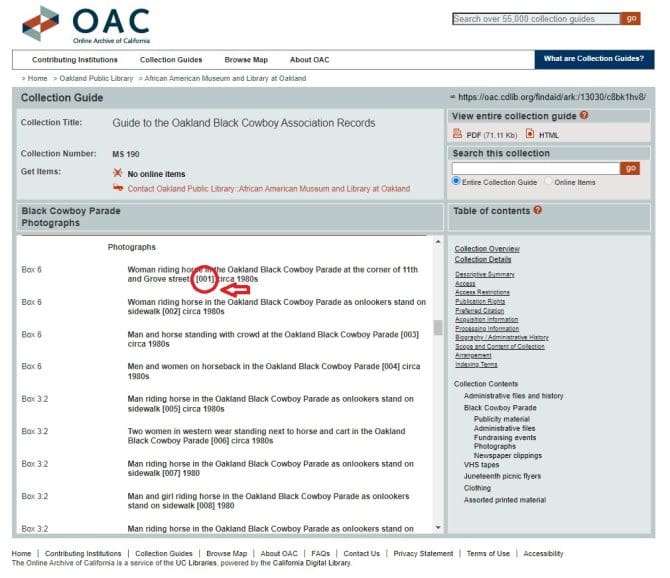
Photographs may also include a photo identification number indicated in brackets, for example [001] or [002]. This can be helpful when requesting specific photographs that you'd like to view or reproduce. Providing the photo identification number is an easy way to help us better locate the individual photograph or digital file.
Digital Collections
Explore 4,010 items items digitized from AAMLO's collections on Calisphere. Learn more about Calisphere by watching an introductory video to learn more about the collections in Calisphere, including how primary source records are described. Some popular AAMLO digital collections include:
- Colored Women's Clubs Associations Collection documenting three different associations of colored women's clubs: the National Association of Colored Women's Clubs; the California State Association of Colored Women's Clubs; and the National Council of Negro Women.
- Cottrell Laurence Dellums Papers providing insight into Dellums' career as a civil rights activist and labor leader with the Brotherhood of Sleeping Car Porters.
- Harold Jenkins Photograph Collection including 81 photographs documenting Harold Slim Jenkins' various businesses in Oakland's historic West Oakland and on Seventh Street.
- West Coast Negro Baseball Association Collection related to the creation and operation of the West Coast Negro Baseball Association and the Oakland Larks.
- and many more
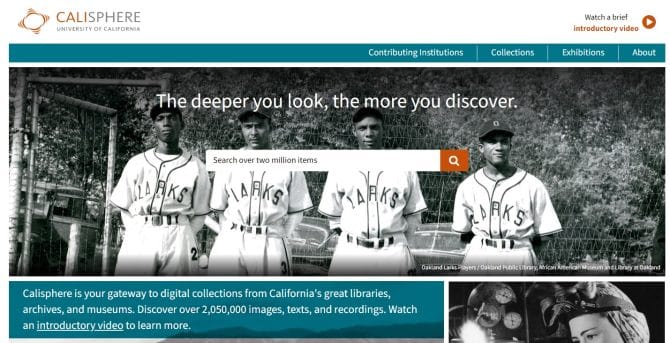
Calisphere landing page with photograph of the Oakland Larks [from the West Coast Negro Baseball Association collection], MS 17, African American Museum & Library at Oakland, Oakland Public Library.]
AAMLO's Internet Archive page contains audiovisual material (moving images and audio) from the 1940s to the 2000s. These recordings include an oral history collection containing recent interviews with African-American residents of Oakland, footage of important Black Panther Party protests and rallies, interviews with Blues musician Brownie McGhee, and home movies recorded by Oakland families.
Periodicals and Microfilm
A full list of AAMLO's periodicals in microfilm can be found here, opens a new window. Appointments to view microfilm require a separate visit to Oakland Public Library's Magazine and Newspapers division located at the Main Library. For more information please contact eanswers@oaklandlibrary.org or (510) 238-3176.
One source to identify California's historic African American periodicals is AAMLO's resource guide on Newspapers and Journalists, opens a new window. Some newspapers, including The Elevator and the Pacific Appeal, are included in the California Digital Newspaper Collection. Select copies of the Western Outlook and Oakland Sunshine can also be freely found on the Portal to Texas History digital collections website.
What to Expect / Reading Room Policies
General Guidelines
- Researchers should request materials by appointment (aamlo@oaklandlibrary.org or 510-637-0200)
- Research materials must be used in the Reading Room.
- No food, drinks, or gum.
- A valid photo ID is required.
- Personal items (bags, purses, briefcases, hats, jackets, etc.) must be stored.
- Pencils only in the reading room. No pens, highlighters, white out, or post-it notes.
- Laptops, tablets, cameras, and cell phones (silenced) are allowed.
- Research photos for private use, scholarship, and research only may be taken without a flash. No personal scanners, tripods, or lights.
- The researcher is responsible for returning all material to a staff member before leaving the Reading Room.
Care and Handling
- Please handle materials with care. Do not write on anything or erase any marks.
- Keep documents flat on the table.
- Use is limited to 1 box at a time. Please remove only one folder or item at a time and maintain the exact order of materials. We ask you not to rearrange materials or remove documents from the folders.
- Gloves are available for handling photographs.
Reproductions and Permissions
- Materials are duplicated by staff only. Researchers must adhere to any copyright restrictions. Please see staff regarding any known restrictions.
- Photographic reproduction (photocopying or scanning) is performed by staff only. All reproductions are subject to the City of Oakland Master Fee Schedules. Please see the current Fiscal Year Adopted Combined Master Fee Schedule (PDF) for more information about reproduction costs and commercial use fees.
- A permission to publish application form must be completed and approved by staff before material may be reproduced or used for commercial/non-commercial purposes.
- Checks are accepted and are payable to the Oakland Public Library.
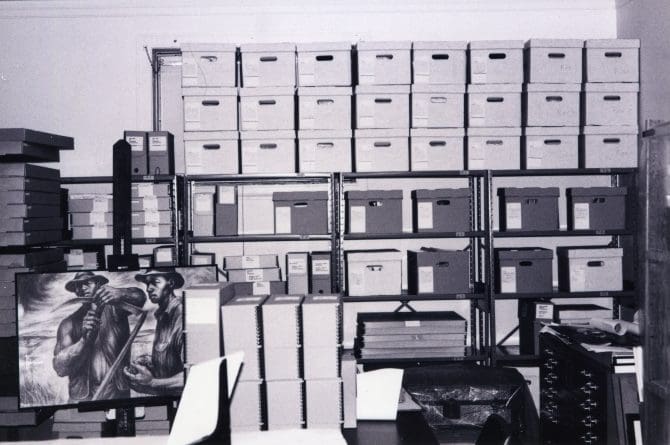
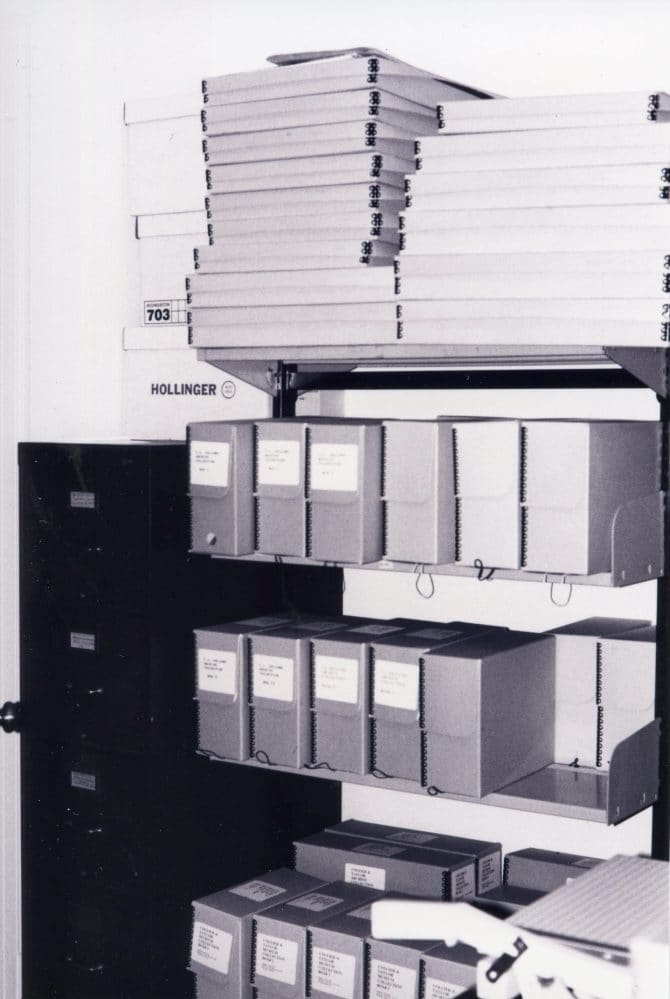
Additional Information
Search the library using the catalog.
Consult AAMLO's finding aids in the Online Archive of California.
We are working to create new resource guides. Have a question or an idea for a new guide? Contact us at aamlo@oaklandlibrary.org.

